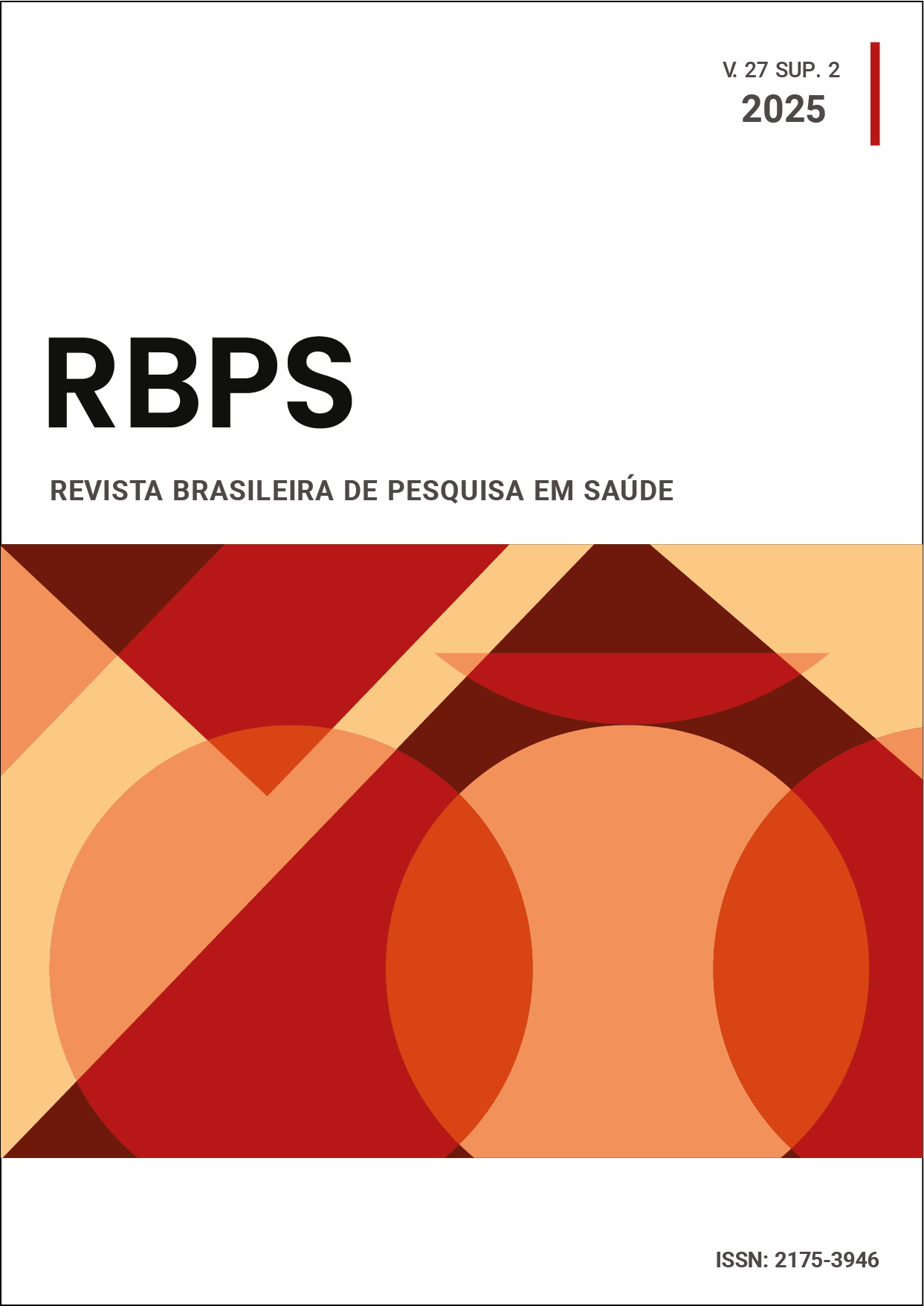Violência obstétrica em uma perspectiva interseccional
revisão narrativa
DOI:
https://doi.org/10.47456/rbps.v27isupl_2.48420Palavras-chave:
Violência obstétrica, Interseccionalidade, Racismo institucionalResumo
Introdução: A violência obstétrica é uma questão de saúde pública, e aprofundar o estudo sobre este fenômeno é um dos caminhos para enfrentá-lo. Consiste em uma apropriação desumanizada do corpo e dos processos reprodutivos das mulheres por profissionais de saúde. Apesar disso, a vivência e as consequências desse tipo de violência não afetam todas as mulheres de forma igualitária. Objetivo: Compreender a violência obstétrica contra mulheres negras a partir da abordagem interseccional, considerando que a interseccionalidade envolve a interação entre dois ou mais eixos de subordinação/discriminação, como o racismo, o patriarcado e a desigualdade social. Métodos: Foi realizada uma revisão narrativa da literatura, analisando artigos publicados nas bases de dados científicas nos últimos 10 anos que abordavam essa temática. Resultados: A pesquisa constatou que mulheres negras são as principais vítimas da violência obstétrica, sendo a análise interseccional essencial para entender a magnitude dessa vitimização. A violência obstétrica contra mulheres negras extrapola a questão de gênero, envolvendo também fatores de raça e classe social. Conclusão: Conclui-se que ser negra e pobre no Brasil aumenta a vulnerabilidade à violência obstétrica, evidenciando o racismo institucional presente nos diversos serviços de saúde.
Downloads
Referências
Organização Mundial da Saúde. Relatório mundial sobre a prevenção da violência 2014. Genebra: Organização Mundial da Saúde; 2014. Disponível em: https://nev.prp.usp.br/wp-content/uploads/2015/11/1579-VIP-Main-report-Pt-Br-26-10-2015.pdf
Damasceno ALS, Arruda AG, Barbosa EDS, Fernandes HMA. Iniquidades interseccionais no atendimento obstétrico às mulheres negras de comunidade quilombola. Rev Ciênc Plural. 2024;10(2):1–16. doi: 10.21680/2446-7286.2024v10n2ID34948.
Leite TH, Marques ES, Corrêa RG, Leal MDC, Olegário BDCD, Costa RMD, et al. Epidemiology of obstetric violence: a narrative review of the Brazilian context. Ciênc Saúde Colet. 2024;29(9):e12222023. doi: 10.1590/1413-81232024299.12222023en.
Lima KDD, Pimentel C, Lyra TM. Disparidades raciais: uma análise da violência obstétrica em mulheres negras. Ciênc Saúde Colet. 2021;26(suppl 3):4909–18. doi: 10.1590/1413-812320212611.3.24242019.
Conselho Federal de Medicina (CFM). Parecer CFM nº 32/2018. Brasília: Conselho Federal de Medicina; 2018. Disponível em: https://sistemas.cfm.org.br/normas/arquivos/pareceres/BR/2018/32_2018.pdf
Ministério Público Federal (MPF). MPF recomenda ao Ministério da Saúde que atue contra a violência obstétrica em vez de proibir o uso do termo [Internet]. 2024 [citado 2024 dez]. Disponível em: http://www.mpf.mp.br/sp/sala-de-imprensa/noticias-sp/mpf-recomenda-ao-ministerio-da-saude-que-atue-contra-a-violencia-obstetrica-em-vez-de-proibir-o-uso-do-termo
G1. Ministério da Saúde reconhece legitimidade do uso do termo 'violência obstétrica'. G1 [Internet]. 2019. Disponível em: https://g1.globo.com/ciencia-e-saude/noticia/2019/06/10/ministerio-da-saude-reconhece-legitimidade-do-uso-do-termo-violencia-obstetrica.ghtml
Migalhas. Violência obstétrica: MPF e entidades repudiam orientação do Ministério da Saúde de abolir termo. Migalhas [Internet]. 2025. Disponível em: https://www.migalhas.com.br/quentes/302078/violencia-obstetrica---mpf-e-entidades-repudiam-orientacao-do-ministerio-da-saude-de-abolir-termo
Santana ATD, Couto TM, Lima KTRDS, Oliveira PSD, Bomfim ANA, Almeida LCG, et al. Obstetric racism, a debate under construction in Brazil: perceptions of black women on obstetric violence. Ciênc Saúde Colet. 2024;29(9):e09952023. doi: 10.1590/1413-81232024299.09952023en.
Leal MC, Gama SGN. Birth in Brazil. Cad Saúde Pública. 2014;30(13). doi: 10.1590/0102-311XED01S114.
Assis JFD. Interseccionalidade, racismo institucional e direitos humanos: compreensões à violência obstétrica. Serv Soc Soc. 2018;(133):547–65. doi: 10.1590/0101-6628.159.
Saraiva VCDS, Campos DDS. The cheapest meat on the market is black meat: notes on racism and obstetric violence against Black women. Ciênc Saúde Colet. 2023;28(9):2511–7. doi: 10.1590/1413-81232023289.05182023en.
Rios F, Ratts A. A perspectiva interseccional de Lélia Gonzalez. In: Chalhoub S, Pinto FM, organizadores. Pensadores negros-pensadoras negras do século XIX e XX. Belo Horizonte: Traço Fino; 2016.
Crenshaw K. Documento para o encontro de especialistas em aspectos da discriminação racial relativos ao gênero. Rev Estud Fem. 2002;10(1):171–88. doi: 10.1590/S0104-026X2002000100011.
Ferreira MS, Gonçalves E. “Parirás com dor”: a violência obstétrica revisitada. Soc Cult [Internet]. 2020 [citado 28 mar 2025];23. Disponível em: https://www.revistas.ufg.br/fcs/article/view/60230
Alves GKA, Lopes RS, Cabral JN, Moreira APA, Cecílio JO, Batista ASFC. Relação entre iniquidades racial e violência obstétrica no parto. Rev Cient Esc Est Saúde Pública Goiás Cândido Santiago. 2023;9(9d3):1–19.
Medeiros RDCDS, Nascimento EGCD. “Na hora de fazer não chorou”: a violência obstétrica e suas expressões. Rev Estud Fem. 2022;30(3):e71008. doi: 10.1590/1806-9584-2022v30n371008.
Cardoso EM, Cockell FF. Atenção à saúde da mulher negra no ciclo gravídico-puerperal: percepções em primeira pessoa. Cad Gên Tecnol. 2019;12(40):111. doi: 10.3895/cgt.v12n40.9485.
Dalenogare G, Vieira LB, Maffacciolli R, Riquinho DL, Coelho DF. Pertencimentos sociais e vulnerabilidades em experiências de parto e gestação na prisão. Ciênc Saúde Colet. 2022;27(1):263–72. doi: 10.1590/1413-81232022271.33922020.
d’Orsi E, Brüggemann OM, Diniz CSG, Aguiar JMD, Gusman CR, Torres JA, et al. Desigualdades sociais e satisfação das mulheres com o atendimento ao parto no Brasil: estudo nacional de base hospitalar. Cad Saúde Pública. 2014;30(suppl 1):S154–68. doi: 10.1590/0102-311x00087813.
Diniz SG, Salgado HDO, Aguiar Andrezzo HFD, Cardin De Carvalho PG, Albuquerque Carvalho PC, Azevedo Aguiar C, et al. Abuse and disrespect in childbirth care as a public health issue in Brazil: origins, definitions, impacts on maternal health, and proposals for its prevention. J Hum Growth Dev. 2015;25(3):377. doi: 10.7322/jhgd.106080.
Marques SB. Violência obstétrica no Brasil: um conceito em construção para a garantia do direito integral à saúde das mulheres. Cad Ibero Am Direito Sanit. 2020;9(1):97–119. doi: 10.17566/ciads.v9i1.585.
Brisola EMA, Ribeiro SLS, Macri LRD, Rodrigues R. Violência obstétrica como violação de direitos humanos das mulheres. Rev Científica Humanidades. 2023;16(1). doi: 10.32813/2179-1120.2023.v16.n1.a930. Disponível em: https://www.rchunitau.com.br/index.php/rch/article/view/930
Akotirene C. O que é interseccionalidade. Belo Horizonte: Letramento; 2018.
Werneck J. Racismo institucional e saúde da população negra. Saúde Soc. 2016;25(3):535–49. doi: 10.1590/s0104-12902016261.
Almeida SL. Racismo Estrutural. São Paulo: Ed. Jandaíra; 2020. (Coleção Feminismo Plurais).
Downloads
Publicado
Edição
Seção
Licença
Copyright (c) 2025 Revista Brasileira de Pesquisa em Saúde/Brazilian Journal of Health Research

Este trabalho está licenciado sob uma licença Creative Commons Attribution-NonCommercial-NoDerivatives 4.0 International License.
A Revista Brasileira de Pesquisa em Saúde (RBPS) adota a licença CC-BY-NC 4.0, o que significa que os autores mantêm os direitos autorais de seus trabalhos submetidos à revista. Os autores são responsáveis por declarar que sua contribuição é um manuscrito original, que não foi publicado anteriormente e que não está em processo de submissão em outra revista científica simultaneamente. Ao submeter o manuscrito, os autores concedem à RBPS o direito exclusivo de primeira publicação, que passará por revisão por pares.
Os autores têm autorização para firmar contratos adicionais para distribuição não exclusiva da versão publicada pela RBPS (por exemplo, em repositórios institucionais ou como capítulo de livro), desde que seja feito o devido reconhecimento de autoria e de publicação inicial pela RBPS. Além disso, os autores são incentivados a disponibilizar seu trabalho online (por exemplo, em repositórios institucionais ou em suas páginas pessoais) após a publicação inicial na revista, com a devida citação de autoria e da publicação original pela RBPS.
Assim, de acordo com a licença CC-BY-NC 4.0, os leitores têm o direito de:
- Compartilhar — copiar e redistribuir o material em qualquer suporte ou formato;
- Adaptar — remixar, transformar, e criar a partir do material.
O licenciante não pode revogar estes direitos desde que você respeite os termos da licença. De acordo com os termos seguintes:
- Atribuição — Você deve dar o crédito apropriado, prover um link para a licença e indicar se mudanças foram feitas. Você deve fazê-lo em qualquer circunstância razoável, mas de maneira alguma que sugira ao licenciante a apoiar você ou o seu uso.
- Não Comercial — Você não pode usar o material para fins comerciais.
- Sem restrições adicionais — Você não pode aplicar termos jurídicos ou medidas de caráter tecnológico que restrinjam legalmente outros de fazerem algo que a licença permita.






















